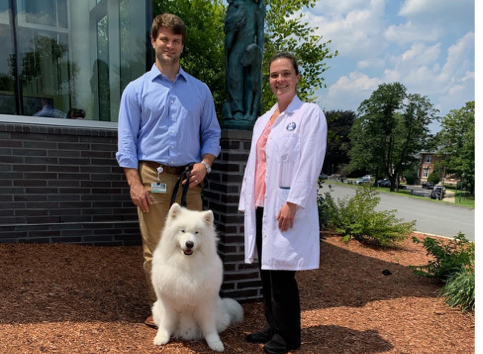-
About
- Leadership & Faculty
- News & Events
-
Admissions
-
Academics
- Graduate
- Advanced Clinical Training
- Continuing Education
- Academic Departments
- Academic Offices
- Simulation Experiences
-
Student Life
- Offices
-
Research
-
- Transformative Research
- Centers & Shared Resources
-
-
Hospitals & Clinics
- Emergency Care
- Hospital Services
-
Community Outreach
- Volunteer
When a Big Loss is a Huge Gain: The Role of Diet in Managing Orthopedic Conditions
Most of us know how important a balanced diet is for our own optimal health. The same holds true for our pets.

Leslie was shocked when she learned that Max, her 4-year-old Samoyed, had gained 15 pounds in the year since his last wellness visit to the veterinarian. “The weight gain was a surprise as Max hid it well under all of his fur,” Leslie said.
Her veterinarian, Jill Patronagio of Hollis Veterinary Hospital, suggested that Leslie start watching Max’s diet. But despite Leslie paying close attention to the feeding directions on the back of the pet-food bag, Max never lost more than a few pounds.
Only a few months later, Max couldn’t stand up without crying. X-rays confirmed that the young dog had moderate to severe hip dysplasia. This condition occurs when the ball of the hip rubs and grinds in the socket instead of sliding smoothly, resulting in the deterioration and eventual loss of joint function.
Dr. Patronagio told Leslie that the best place to explore surgical treatment was the Foster Hospital for Small Animals at Cummings School of Veterinary Medicine—especially for complex cases such as Max’s. A consult with Michael Karlin, a board-certified orthopedic veterinarian at the Foster Hospital, reconfirmed hip dysplasia in both hips.
“Dr. Karlin’s knowledge of orthopedics was impressive. He explained all surgical options in a way I could understand. As an engineer, I asked so many questions that he patiently addressed,” Leslie said. However, rather than immediately pursue total-hip-replacement surgery, Dr. Karlin prescribed daily pain medication and that Max loses some weight and then be re-evaluated.
For assistance with that weight loss, Dr. Karlin referred Max to Deborah Linder, a board-certified veterinary nutritionist at the Foster Hospital. With a practice initially devoted to obesity clients, Dr. Linder has seen many overweight dogs. She explained how critical the owner’s commitment is to achieving weight-loss goals and stressed the importance of looking at all the foods pets consume, including treats.
“We had a lot to consider including Max’s sensitive stomach, and we didn’t want to take away all his favorite foods,” Linder said. “It’s all about compromises.”
Linder ultimately prescribed a minimum weight-loss goal of dropping 5 to 8 pounds. Max’s new diet consisted of 800 calories a day from nutrient-dense, calorie-light foods, with no more than 10 percent of his total calories coming from treats.
As Leslie and Max undertook his weight-loss journey, “Drs. Karlin and Linder checked in with me regularly and were very supportive throughout,” Leslie said. “Every person we met was kind and warm, and their expertise and knowledge top-notch.”
Today, eight months after starting his diet, Max has lost 22 pounds, and his pain is now being managed with medication every other day.
Max’s success demonstrates Leslie’s dedication, as well as the value of collaboration between specialty services at Cummings School. Taking a holistic approach, Linder and Karlin agree is valuable for the wellbeing of all patients. “We operate based on pets’ clinical signs and level of pain, not because of the radiograph (X-rays),” said Karlin. “With appropriate weight management and maintenance, our canine pets often can live a high-quality life without needing surgery.”
These days, Max is moving more freely and with less pain. “While I had every confidence that Max would have had best-in-class hip surgery, I am grateful that he doesn’t have to undergo it at this time,” Leslie said.
Department:
Foster Hospital for Small Animals